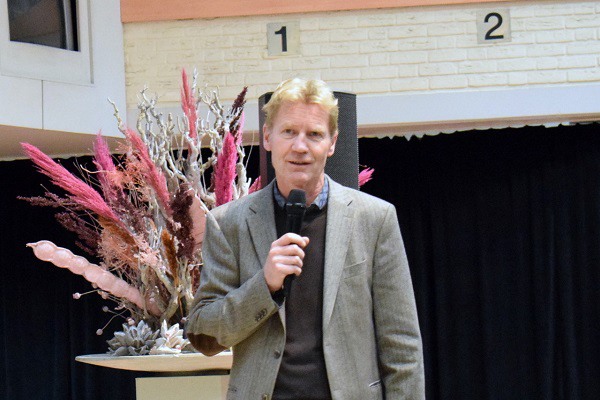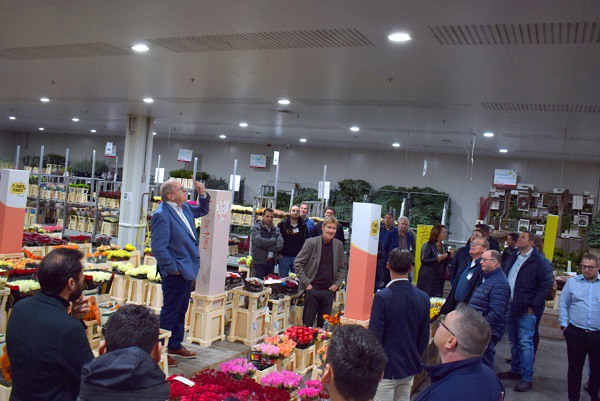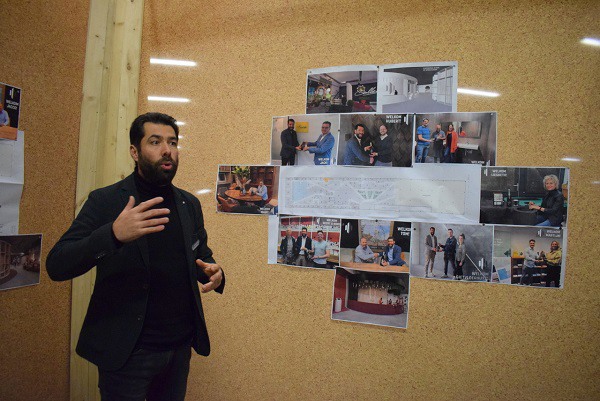The flower and plant sector is also undergoing consolidation in auction country. New business models are growing and flourishing in the old auction building of FloraHolland Venlo at the moment. The Businessclub Fresh Park Venlo went there to take a look and learn about the challenges in times of crisis in floriculture and the fair's version 2.0: Daily Trade Fair.
Click here for the photo report.
Veiling Rhein-Maas is a joint venture between Landgard and Royal FloraHolland and was founded on 29 November 2010 in order to achieve a better match between supply and demand, to achieve more stable price development and cost reduction. This created the only flower and plant auction in the heart of the Euregion connected to the Landgard and Royal FloraHolland networks.
The challenges in floriculture are no different from those in the fresh produce sector: sharply rising costs for labor, energy, and raw materials, sustainability, and critical consumers with low consumer confidence.

Auction director of Veiling Rhein-Maas Cees Hoekstra
Supply of ornamentals is falling, with high energy prices also causing a shift. Energy-hungry products such as greenhouse flowers (roses) and tropical plants, in particular, are under the most pressure. Auction director Cees Hoekstra expects gaps to appear in the market, and growers are planting later, causing production to enter the market later. The cultivated area (under glass) remains intact. Few growers are stopping so far, and if they stop, the company is mostly taken over by another grower. Cees Hoekstra does expect shrinkage in the future. Also because the consumption of ornamental plant products is declining in the Netherlands, Germany, France, and (less rapidly) England. Consumers are also looking more and more critically and consciously at the sector, and they factor that into their buying considerations. How sustainable (grown) are flowers and plants?
Click here for the photo report.
Plenty of challenges accompanied by many uncertainties in the market make it difficult to make forecasts. After an exceptionally good year in 2021, when consumers bought a lot of flowers and plants in corona time, Veiling Rein-Maas expects to end the year well with a turnover of 400 million, with mediation costs rising and auction clock turnover remaining about the same.
Next year, Veiling Rhein-Maas expects more products to be brought before the auction clock, as few forward contracts have yet been concluded. Everything will depend on demand. What does the consumer, who has less to spend, have to spare for atmosphere, cheerfulness, and color? "It could be the best year ever, or we could all end up in the gutter," says Cees.

Lex Ebus talks about how the cooling system works
At the very opposite end of the road, accessible via a tunnel, is Cash&Carry FloraZON, where five entrepreneurs offer fresh flowers and the latest trends in decoration on 59,000 m2 (29,000 m2 of flowers and 30,000 m2 of garden plants). Cash&Carry FloraZON is a favorable development for Veiling Rhein-Maas, which is keen on large buyers that will allow it to operate more efficiently and cheaply. The auction has raised rates for smaller buyers.
The strength of the cash&carry center is the purchasing convenience for florists who can buy there at bouquet level. The center is open seven days a week from 5.30 am to 8 pm, and it is precisely those early and late hours that are the peak hours at the center.
Click here for the photo report.
Project developer, grower, and entrepreneur Lex Ebus showed some innovations within FloraZON, including a cooling system with a double ceiling. This allows cold air to flow down through holes in the ceiling. No ventilation takes place, and this makes the felt temperature much higher than the actual temperature of 7 degrees Celsius, which makes it a lot more pleasant to shop/work there. He also talked about the close cooperation between his company and breeders. Ebus can test innovations and new varieties for them all the way to the florist.

Harm van Raaij talks about future developments within Daily Fair Trade
The third component was a visit to the Daily Trade Fair, which is an innovative step in the way companies in home, decoration, and hospitality can present themselves to B2B customers. It will be an exhibition floor that is simultaneously a meeting place for exhibitors and visitors 350 days a year. All the disadvantages of an ordinary fair are removed. "No parking costs, no overcrowded shuttle buses, no entrance fees or high catering prices, just welcoming inspiration and shopping at a time that the visitor can decide. Daily Trade Fair is open seven days a week (350 days p.y.)," Lex Ebus told us. Visitors can visit an (unmanned) stand and use an app to scan and order products they want to purchase. At the heart of the Daily Trade Fair will be the hospitality pillar, where experiences and novelties will take center stage. In addition, the old auction building, with its still intact auction room, will accommodate events for (large) groups and changing trade fairs.










